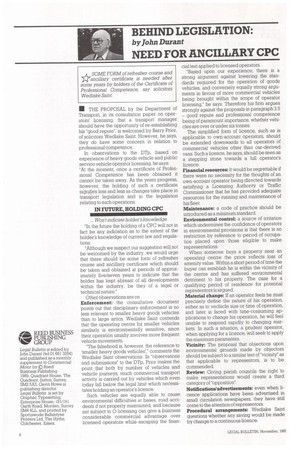BEHIND LEGISLATION:
Page 118

If you've noticed an error in this article please click here to report it so we can fix it.
by John Durant
NEED FOR ANCILLARY CPC
• THE PROPOSAL by the Department of Transport, in its consultation paper on operators licensing, that a transport manager should have the opportunity of re-establishing his "good repute, is welcomed by Barry Prior, of solicitors Wedlake Saint. However, he says, they do have some concern in relation to professional competence.
In observations to the DTp, based on experience of heavy goods vehicle and public service vehicle operator licensing, he says: At the moment, once a certificate of Professional Competence has been obtained it cannot be taken away. As the years progress, however, the holding of such a certificate signifies less and less as changes take place in transport legislation and in the legislation relating to such operations.
...Won't indicate holder's knowledge "In the future the holding of a CPC will not in fact be any indication as to the extent of the holder's knowledge of current law and regulations.
"Although we suspect our suggestion will not be welcomed by the industry, we would urge that there should be some form of refresher course and ancillary certificate which should be taken and obtained at periods of approximately five/seven years to indicate that the holder has kept abreast of all developments within the industry, be they of a legal or technical nature."
Other observations are on Enforcement: the consultative document points out that disciplinary enforcement is no less relevant to smaller heavy goods vehicles than to large artics. Wedlake Saint contends that the operating centre for smaller vehicles similarly is environmentally sensitive, since their operation usually involves more frequent vehicle movements.
"The falsehood is, however, the reference to 'smaller heavy goods vehicles',' comments the Wedlake Saint observations. In "observations and submissions" to the DTp, Prior makes the point that both by number of vehicles and vehicle journeys, much commercial transport activity is carried out by vehicles which even today fall below the legal limit which necessitates holding an operator's licence.
Such vehicles are equally able to cause environmental difficulties at bases, road accidents if not properly maintained, and because not subject to 0-licensing can give a business considerable commercial advantage over licensed operators while escaping the finan c al test applied to licensed operators.
°Based upon our experience, there is a strong argument against lowering the standards required for the operation of goods vehicles, and conversely equally strong arguments in favour of more commercial vehicles being brought within the scope of operator licensing," he says. Therefore his firm argues strongly against the proposals in paragraph 3.5 good repute and professional competence being of paramount importance, whether vehicles are over or under six tonnes.
The simplified form of licence, such as is applicable to own-account operators, should be extended downwards to all operators of commercial vehicles other than car-derived vans. Such a licence, he says, should be seen as a stepping stone towards a full operator's licence.
Financial resources: It would be regrettable if there were no necessity for the thoughts of an own-account operator being directed towards satisfying a Licensing Authority or Traffic Commissioner that he has provided adequate resources for the running and maintenance of his fleet.
Maintenance: a code of practice should be introduced as a minimum standard.
Environmental control: a source of irritation which undermines the confidence of operators in environmental provisions is that there is no restriction by reference to period of occupation placed upon those eligible to make representations.
When someone buys a property near an operating centre the price reflects loss of amenity value. Within a short period of time the buyer can establish he is within the vicinity of the centre and has suffered environmental detriment to his property. The case for a qualifying period of residence for potential representors is argued.
Material change: If an operator feels he must precisely define the nature of his operation, either as to vechicle size or time of operation, and later is faced with time-consuming applications to change his operation, he will feel unable to respond rapidly to changing markets. In such a situation, a prudent operator, when applying for a licence, will seek to apply the maximum paramaters.
Vicinity: The proposal that objections upon environmental grounds made by objectors should be subject to a similar test of "vicinity' as that applicable to representors, is to be commended.
Review: Giving parish councils the right to make representations would create a third category of "opposition".
Notillcations/advertisements: even when licence applications have been advertised in small circulation newspapers, they have still come to the attention of representors.
Procedural arrangements: Wedlake Saint questions whether any saving would be made by change to a continuous licence.


























































































































































